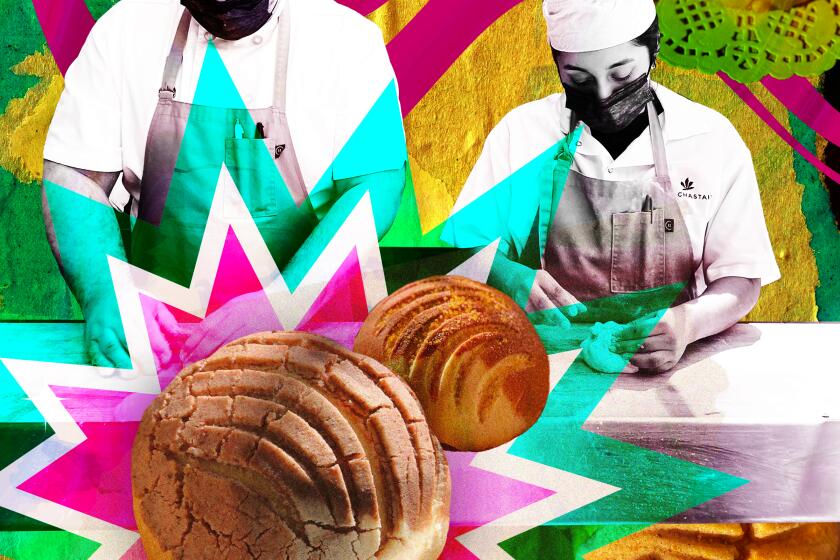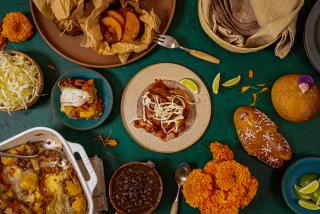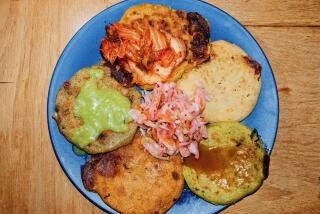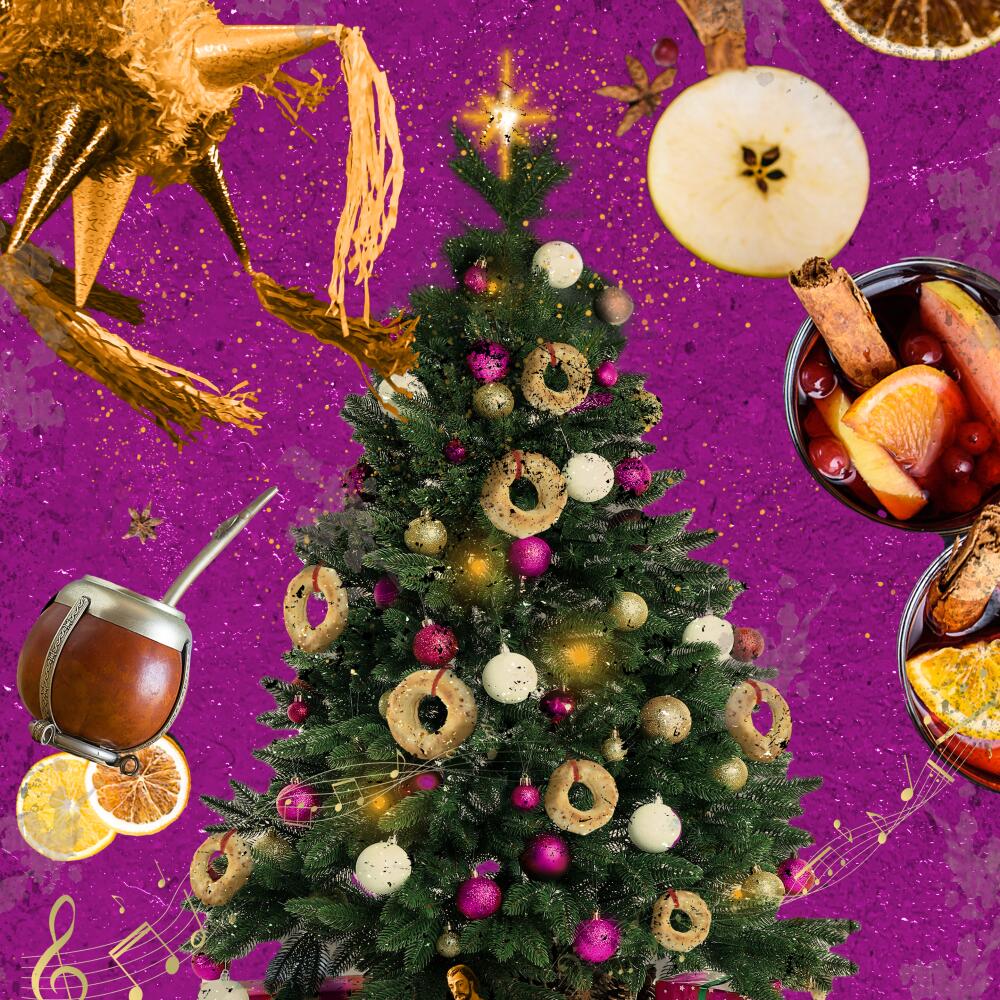
As the holiday season begins, the streets of Latin America come alive with festive colors, joyful music and unique customs that reflect the region’s rich cultural heritage. From Mexico to Argentina, each country brings its flair to Christmas and New Year’s Eve celebrations.
This is the first of a three-part series that will cover some of the well-known holiday traditions of all the countries across Latin America.
Mexico
The holiday season in Mexico “starts from Dec. 16 to 24 with the posadas. For us Mexicans, the posadas are super important,” said Jazmín Galván, head of the Department of Tourist Promotion at the Mexican Consulate in Los Angeles. Posadas are a tradition that involves a nightly procession, where communities come together to reenact the journey of Mary and Joseph seeking shelter in Bethlehem.
There are over 2,000 variations of pan dulce, but the soft bread bun topped with sweet cookie-like dough is popular for a reason.
“In the posadas we make ponche, pozole, tamales. They encompass everything that means traditional Mexican gastronomy. We sing villancicos and we break piñatas. We even have pastorelas, witty stories told from the point of view of angels and little devils.”
Another staple of Mexican holiday traditions is pan de bolillo. This bread roll is “a must because the next day, on either date [Christmas or New Year’s Eve], people make the classic, traditional and unforgettable recalentado [reheated], which is about eating the same food as the day before but as a filling in a torta,” Galván explained. Tortas are Mexican sandwiches made with pan de bolillo and filled with a variety of meats.
El Salvador
During the holidays in El Salvador, it’s common for most families to play cumbia. “La Bala by Los Hermanos Flores reminds me a lot of my Christmas in El Salvador,” said Laura Morales, an account supervisor for an advertising agency in Los Angeles.
They also enjoy panes rellenos, a bread roll “filled with chicken or turkey, tomato sauce, cucumber, radish and curtido. The curtido contains cabbage, carrots and vinegar and is usually prepared ahead of time to absorb the juices and have a better flavor,” said Morales. Some people also prepare gallo en chicha, “chicken fermented in liquor that is an autochthonous Salvadoran dish,” said Teresa Tejada, director of the Cultural Department of the Salvadorean Assn. of Los Angeles.
Morales also shared a New Year’s Eve tradition that involves blessed lentils. “My mom takes them [lentils] to the church to be blessed and distributes them on New Year’s Eve, so they become a symbol that we are going to do well financially.”
How do you compassionately get rid of the things your immigrant parents hold onto that are piling up in their home?
Paraguay
In December, coconut trees bloom a golden flower known as flor de coco, an essential element for a Paraguayan Christmas. “The flor de coco is very traditional, with an extraordinary perfume. There are even songs dedicated to it, such as ‘Navidad de Flor de Coco,’” said Manuel Ruíz Díaz, consul general of Paraguay in Los Angeles.
The asado, a traditional barbecue, is one of the dishes on many Paraguayan holiday tables. What sets it apart from other Latin American variations is the “exclusive use of charcoal,” said Díaz. “The asado is a ceremony; it can take up to three hours to prepare.”
Another element is the chipa. “It’s the bread of Paraguay,” Ruíz said. It’s a small roll baked in the shape of a bagel made of ingredients like mandioca flour and cheese, and is also used to decorate the Christmas tree.
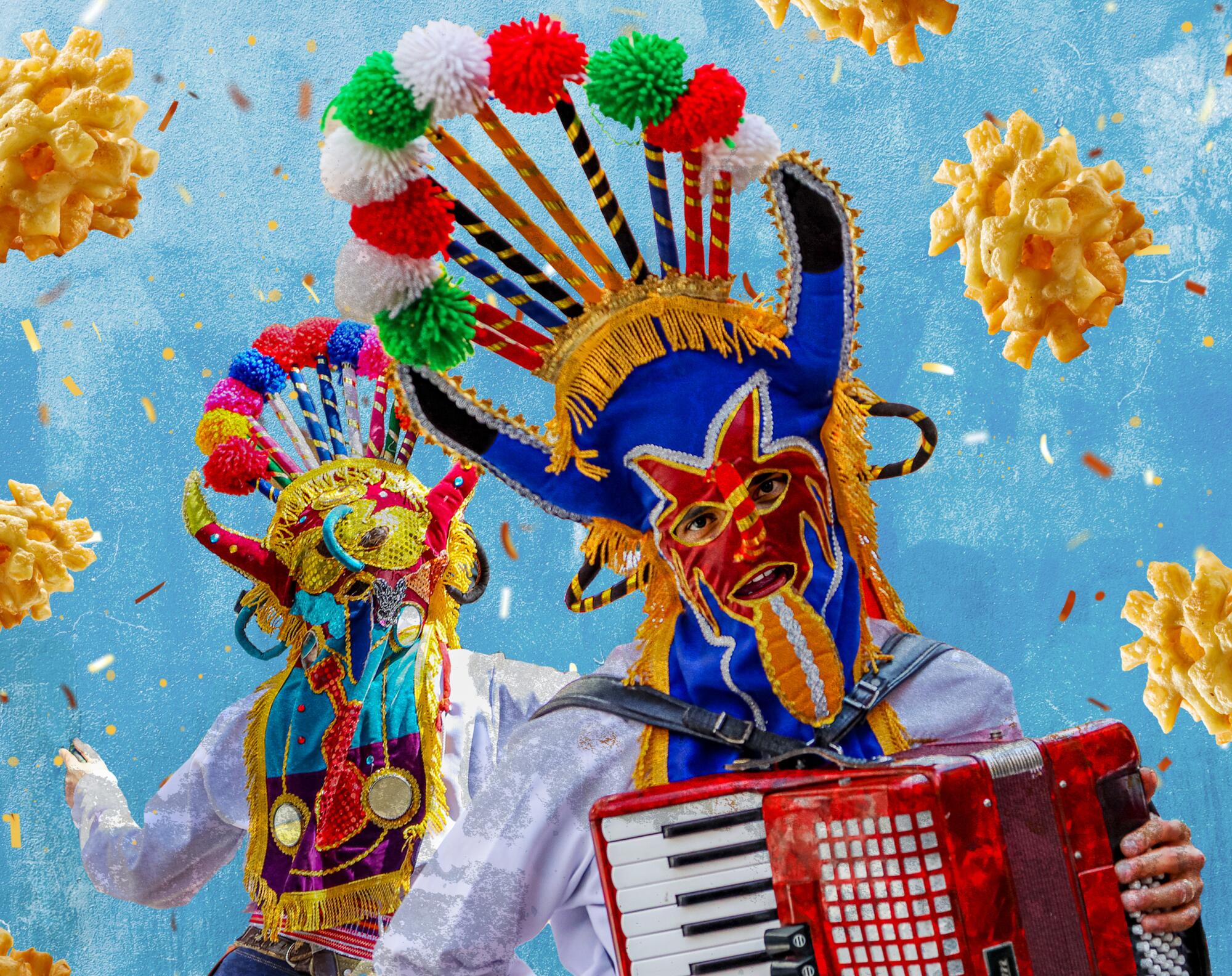
Ecuador
The traditional Ecuadorian villancicos by Los Pibes Trujillo are enjoyed by many families during the holidays. “Claveles y Rosas is the most classical,” said Xavier Toscano, president of Foundation Club Luz De América.
Regarding popular holiday dishes, pavo relleno is at the top of the list. “It’s stuffed with apples, nuts, prunes, pork meat, onions and spices, and marinated at least two days in advance,” said María Escobar, coordinator of vulnerability management at the L.A. Consulate of Ecuador. There’s also a dessert called pristiños, a star-shaped fried dough “topped with a brown sugar syrup infused with cinnamon and cloves,” said Escobar.
A new twist on meeting your partner’s family has arrived this holiday season in ‘How the Gringo Stole Christmas,’ directed by Angel Gracia and starring George Lopez.
“There are several Christmas traditions in Ecuador, which are celebrated in different cities, among which stand out some colorful parades known as the Pase del Niño,” explained Escobar. Participants “are colorfully dressed, with beautiful costumes, adorned with many flowers and pouring incense.”
Bolivia
Bolivian holiday traditions include the picana, a rich soup “which contains four types of meat — chicken, lamb, pork and beef — and is cooked with wine, raisins and almonds,” said Paola Vargas, owner of the Bolivian restaurant Pao’s Pastries & Café in Van Nuys. “The picana is accompanied by traditional fried pasteles,” a small half-moon-shaped dough with crimped edges filled with beef or cheese.
The New Year is welcomed with a glass of “a very traditional beverage called chuflay,” said Vargas. It’s a cocktail made with flavored soda, and Singani, a Bolivian grape-based brandy. “[The New Year] is a family reunion, where we meet again after a long time. It’s a very special reason for all of us to get together.”
Costa Rica
Tamales are part of the Costa Rican holiday tradition. “Every family gathers the week before Christmas or a little before that to make the tamales together,” said Ana Elena Rojas Alvarez, consul general of Costa Rica in L.A. “For me, a tamal is not a tamal unless you have salsa like lizano, a brown-colored vegetable sauce that brings the flavors out.”
The first edition of De Los|Reads features a new fiction book from Mario Vargas Llosa, a cookbook from Sandra A. Gutierrez, several memoirs and a book for children who aren’t ready for bed.
Christmas cake, or fruitcake, is also part of the holiday customs for many Costa Ricans. “Around September or, even the year before, they start making the Christmas cake. They make it so early because they soak it in liquor and then put it in the fridge, so when you cut it, it’s like a brown cake with dry fruits, and it’s soaking wet,” said Rojas Alvarez.
As the clock approaches midnight on New Year’s Eve, it’s popular for households to tune into a radio countdown, awaiting the song “Año Viejo” by Tony Camargo. “As a foreigner in another country, at midnight, 12:01 a.m., that song is on my phone,” said Rojas Alvarez.
Argentina
In December, the jasmine blooms in Argentina. For many, this is the scent of the holidays. “Every time I think of Christmas in Argentina, that smell comes to my mind,” said Pepita Sandwich, an illustrator and visual artist in New York.
Asado, the Argentinian barbecue, is beloved during the holiday season. “In Argentina, meat is a very big tradition and market, so a lot of people do asados,” said Pepita Sandwich. They also enjoy “a very typical dish called vitel tone, which is sliced cold veal covered with tuna sauce and capers.”
When New Year’s Eve approaches, wearing pink underwear is popular. “This is for good luck for the next year,” Pepita Sandwich said.
Roxsy Lin is a bilingual journalist and illustrator originally from Venezuela. Her work focuses on the pulse of the modern rhythms of Latinidad, arts and culture. @roxsy_lin
More to Read
The Latinx experience chronicled
Get the Latinx Files newsletter for stories that capture the multitudes within our communities.
You may occasionally receive promotional content from the Los Angeles Times.
